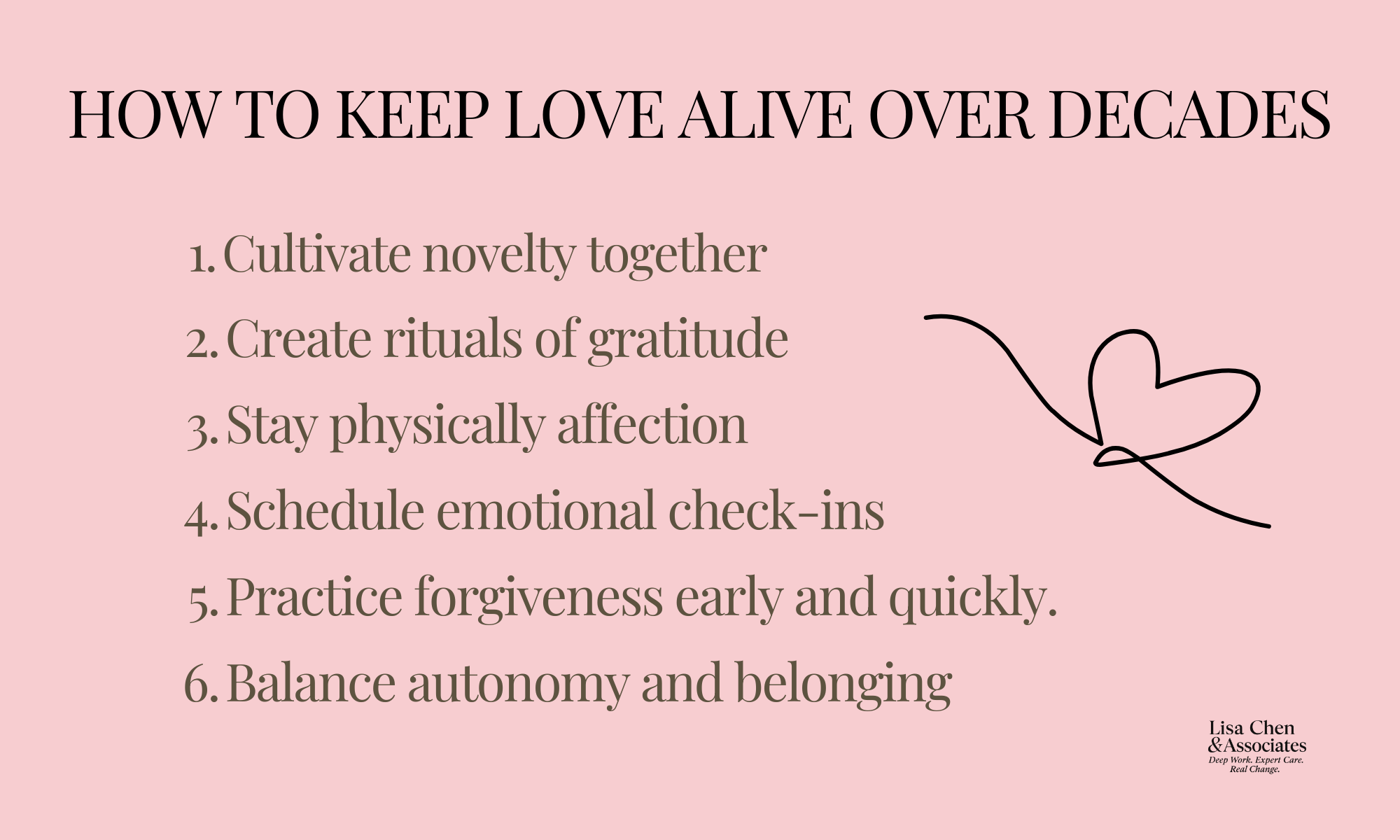The Science of Love Over Time: Why Long-Term Love Feel Different—And Deeper
Quick Summary
Love doesn’t fade—it transforms. Modern neuroscience shows that long-term relationships evolve from dopamine-fueled passion to oxytocin-based emotional security. This article explores how couples can strengthen mature love through forgiveness, novelty, and emotional regulation. Backed by studies from TecScience (2025), Qualia Life (2025), and University of Zurich (2024), we’ll look at the chemistry, psychology, and practices that keep long-term relationships vibrant.
If you’re searching for a couples therapist near me to deepen connection and rekindle intimacy, Lisa Chen & Associates Therapy in Hermosa Beach offers evidence-based couples therapy rooted in neuroscience and attachment theory.
(Internal link suggestion: link “couples therapy” to your Gottman or Couples Therapy page on www.lisachentherapy.com.)
1. Early Love: The Rush of Dopamine and Discovery
In the early years of a relationship, the brain releases a surge of dopamine, serotonin, and norepinephrine—the chemicals that make love feel addictive and exhilarating.
A 2025 TecScience article notes that “the dopaminergic system becomes activated even when a person merely looks at pictures of their partner due to oxytocin release.” (TecScience, 2025)
Neuroscientist Irving Rodríguez found that dopamine actually suppresses the prefrontal cortex, the brain’s center for judgment and reasoning. That’s why early passion can feel so consuming—it literally quiets the part of your brain that moderates impulsivity and risk-taking.
According to the Pacific Neuroscience Institute (Jethani, 2025), this phase also reduces amygdala activity, lowering anxiety and increasing emotional bonding.
“Early love often feels like falling out of control,” says Lisa Chen, LMFT. “But it’s actually your brain’s reward system at work—wired to help you attach quickly.”
2. Long-Term Love: Oxytocin, Safety, and Synchrony
After 10, 20, or 30 years together, love moves beyond euphoria into emotional steadiness. A Qualia Life article (“Love on the Brain: The Neurobiology of Love,” 2025) explains that long-term couples show continued dopamine activation along with activity in oxytocin and vasopressin receptor–dense regions, which support caregiving and security.
(Qualia Life, 2025)
“Long-term love feels calmer because it’s not about the chase—it’s about co-regulation,” notes Lisa Chen, LMFT. “It’s the difference between fireworks and a fireplace—less spark, but more warmth.”
This stage mirrors the attachment systems seen in parent-infant bonding—suggesting that deep emotional intimacy is less about intensity and more about safety and attunement.
3. What Long-Term Studies Reveal About Happiness in Love
A decade-long study by Markus Roth and colleagues (University of Zurich and University of Konstanz) tracked romantic couples over 10 years, showing that those who maintained high relationship satisfaction also reported better mental health, life satisfaction, and emotional regulation.
(Roth et al., 2024, International Journal of Applied Positive Psychology)
Couples who started strong and stayed emotionally attuned experienced:
Higher resilience
Lower psychological distress
Better conflict recovery
The takeaway: consistency—not perfection—keeps relationships healthy.
4. Forgiveness and Renewal: The Psychological Glue
A 2024 study in The International Journal of Indian Psychology found that forgiveness is a key predictor of relationship longevity. Couples who forgive report greater intimacy and empathy, while those who hold grudges remain stuck in cycles of reactivity.
(Sharma & Kola, 2024)
“Forgiveness is what turns rupture into repair. It’s less about erasing what happened and more about reclaiming emotional safety after conflict.”
Securely attached partners find it easier to forgive, while anxious or avoidant partners may ruminate or shut down—making emotional repair even more vital. Do you know your attachment style?
5. How to Keep Love Alive Over Decades
Research-backed ways to deepen long-term connection:
Cultivate novelty together — Try new activities, travel, or shared learning experiences to re-ignite dopamine and curiosity.
Create rituals of gratitude — Daily appreciation strengthens trust and emotional reciprocity.
Stay physically affectionate — Touch releases oxytocin, reinforcing calm and connection.
Schedule emotional check-ins — Weekly “state of us” conversations help you co-regulate stress.
Practice forgiveness early — Don’t wait for resentment to calcify; repair small hurts quickly.
Balance autonomy and belonging — Support each other’s individuality while maintaining shared goals.
6. For Therapists and Couples Coaches
Clinicians can integrate this research into therapy by focusing on:
Attachment re-regulation (helping partners express needs safely)
Dyadic coping (managing stress as a team)
Forgiveness training (structured repair work)
Relational novelty therapy (building shared curiosity and growth)
Example prompts for couples therapy sessions:
“How do we co-regulate after stress?”
“What kind of shared novelty could we bring into our relationship this month?”
Closing Thought
Love’s evolution isn’t decline—it’s maturation.
Early infatuation lights the spark, but mature love fuels the hearth. When couples embrace change, practice forgiveness, and nurture emotional safety, they tap into the neural systems built for lifelong connection.
“The real work of love is learning how to stay connected when the dopamine fades—but the meaning deepens.”
If you’re looking for a couples therapist in Hermosa Beach or Los Angeles who specializes in relationship repair and emotional reconnection, visit Lisa Chen & Associates Therapy to schedule a consultation.
FAQ
1. How can couples therapy help long-term relationships?
Couples therapy helps partners understand attachment patterns, strengthen communication, and re-ignite emotional connection using evidence-based approaches like the Gottman Method and Emotionally Focused Therapy (EFT).
2. Can long-term relationships still feel exciting?
Yes. Novelty, shared experiences, and emotional openness stimulate dopamine even decades into a relationship.
3. How do I find a good couples therapist near me?
Search for licensed therapists specializing in relationships, ideally trained in Gottman or EFT, and look for someone whose style feels emotionally safe and collaborative.



